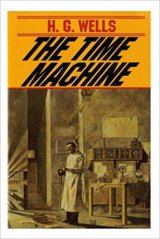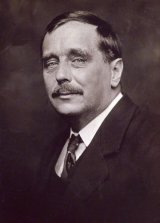The Time Machine Page #8
The Time Machine is a science fiction novella by H. G. Wells, published in 1895 and written as a frame narrative. The work is generally credited with the popularization of the concept of time travel by using a vehicle or device to travel purposely and selectively forward or backward through time.
VI The Sunset of Mankind “A queer thing I soon discovered about my little hosts, and that was their lack of interest. They would come to me with eager cries of astonishment, like children, but, like children they would soon stop examining me, and wander away after some other toy. The dinner and my conversational beginnings ended, I noted for the first time that almost all those who had surrounded me at first were gone. It is odd, too, how speedily I came to disregard these little people. I went out through the portal into the sunlit world again as soon as my hunger was satisfied. I was continually meeting more of these men of the future, who would follow me a little distance, chatter and laugh about me, and, having smiled and gesticulated in a friendly way, leave me again to my own devices. “The calm of evening was upon the world as I emerged from the great hall, and the scene was lit by the warm glow of the setting sun. At first things were very confusing. Everything was so entirely different from the world I had known—even the flowers. The big building I had left was situated on the slope of a broad river valley, but the Thames had shifted, perhaps, a mile from its present position. I resolved to mount to the summit of a crest, perhaps a mile and a half away, from which I could get a wider view of this our planet in the year Eight Hundred and Two Thousand Seven Hundred and One, A.D. For that, I should explain, was the date the little dials of my machine recorded. “As I walked I was watching for every impression that could possibly help to explain the condition of ruinous splendour in which I found the world—for ruinous it was. A little way up the hill, for instance, was a great heap of granite, bound together by masses of aluminium, a vast labyrinth of precipitous walls and crumpled heaps, amidst which were thick heaps of very beautiful pagoda-like plants—nettles possibly—but wonderfully tinted with brown about the leaves, and incapable of stinging. It was evidently the derelict remains of some vast structure, to what end built I could not determine. It was here that I was destined, at a later date, to have a very strange experience—the first intimation of a still stranger discovery—but of that I will speak in its proper place. “Looking round, with a sudden thought, from a terrace on which I rested for a while, I realised that there were no small houses to be seen. Apparently the single house, and possibly even the household, had vanished. Here and there among the greenery were palace-like buildings, but the house and the cottage, which form such characteristic features of our own English landscape, had disappeared. “‘Communism,’ said I to myself. “And on the heels of that came another thought. I looked at the half-dozen little figures that were following me. Then, in a flash, I perceived that all had the same form of costume, the same soft hairless visage, and the same girlish rotundity of limb. It may seem strange, perhaps, that I had not noticed this before. But everything was so strange. Now, I saw the fact plainly enough. In costume, and in all the differences of texture and bearing that now mark off the sexes from each other, these people of the future were alike. And the children seemed to my eyes to be but the miniatures of their parents. I judged then that the children of that time were extremely precocious, physically at least, and I found afterwards abundant verification of my opinion. “Seeing the ease and security in which these people were living, I felt that this close resemblance of the sexes was after all what one would expect; for the strength of a man and the softness of a woman, the institution of the family, and the differentiation of occupations are mere militant necessities of an age of physical force. Where population is balanced and abundant, much childbearing becomes an evil rather than a blessing to the State; where violence comes but rarely and offspring are secure, there is less necessity—indeed there is no necessity—for an efficient family, and the specialisation of the sexes with reference to their children’s needs disappears. We see some beginnings of this even in our own time, and in this future age it was complete. This, I must remind you, was my speculation at the time. Later, I was to appreciate how far it fell short of the reality. “While I was musing upon these things, my attention was attracted by a pretty little structure, like a well under a cupola. I thought in a transitory way of the oddness of wells still existing, and then resumed the thread of my speculations. There were no large buildings towards the top of the hill, and as my walking powers were evidently miraculous, I was presently left alone for the first time. With a strange sense of freedom and adventure I pushed on up to the crest. “There I found a seat of some yellow metal that I did not recognise, corroded in places with a kind of pinkish rust and half smothered in soft moss, the arm-rests cast and filed into the resemblance of griffins’ heads. I sat down on it, and I surveyed the broad view of our old world under the sunset of that long day. It was as sweet and fair a view as I have ever seen. The sun had already gone below the horizon and the west was flaming gold, touched with some horizontal bars of purple and crimson. Below was the valley of the Thames, in which the river lay like a band of burnished steel. I have already spoken of the great palaces dotted about among the variegated greenery, some in ruins and some still occupied. Here and there rose a white or silvery figure in the waste garden of the earth, here and there came the sharp vertical line of some cupola or obelisk. There were no hedges, no signs of proprietary rights, no evidences of agriculture; the whole earth had become a garden. “So watching, I began to put my interpretation upon the things I had seen, and as it shaped itself to me that evening, my interpretation was something in this way. (Afterwards I found I had got only a half truth—or only a glimpse of one facet of the truth.) “It seemed to me that I had happened upon humanity upon the wane. The ruddy sunset set me thinking of the sunset of mankind. For the first time I began to realise an odd consequence of the social effort in which we are at present engaged. And yet, come to think, it is a logical consequence enough. Strength is the outcome of need; security sets a premium on feebleness. The work of ameliorating the conditions of life—the true civilising process that makes life more and more secure—had gone steadily on to a climax. One triumph of a united humanity over Nature had followed another. Things that are now mere dreams had become projects deliberately put in hand and carried forward. And the harvest was what I saw!
Translation
Translate and read this book in other languages:
Select another language:
- - Select -
- 简体中文 (Chinese - Simplified)
- 繁體中文 (Chinese - Traditional)
- Español (Spanish)
- Esperanto (Esperanto)
- 日本語 (Japanese)
- Português (Portuguese)
- Deutsch (German)
- العربية (Arabic)
- Français (French)
- Русский (Russian)
- ಕನ್ನಡ (Kannada)
- 한국어 (Korean)
- עברית (Hebrew)
- Gaeilge (Irish)
- Українська (Ukrainian)
- اردو (Urdu)
- Magyar (Hungarian)
- मानक हिन्दी (Hindi)
- Indonesia (Indonesian)
- Italiano (Italian)
- தமிழ் (Tamil)
- Türkçe (Turkish)
- తెలుగు (Telugu)
- ภาษาไทย (Thai)
- Tiếng Việt (Vietnamese)
- Čeština (Czech)
- Polski (Polish)
- Bahasa Indonesia (Indonesian)
- Românește (Romanian)
- Nederlands (Dutch)
- Ελληνικά (Greek)
- Latinum (Latin)
- Svenska (Swedish)
- Dansk (Danish)
- Suomi (Finnish)
- فارسی (Persian)
- ייִדיש (Yiddish)
- հայերեն (Armenian)
- Norsk (Norwegian)
- English (English)
Citation
Use the citation below to add this book to your bibliography:
Style:MLAChicagoAPA
"The Time Machine Books." Literature.com. STANDS4 LLC, 2025. Web. 22 Jan. 2025. <https://www.literature.com/book/the_time_machine_159>.




Discuss this The Time Machine book with the community:
Report Comment
We're doing our best to make sure our content is useful, accurate and safe.
If by any chance you spot an inappropriate comment while navigating through our website please use this form to let us know, and we'll take care of it shortly.
Attachment
You need to be logged in to favorite.
Log In